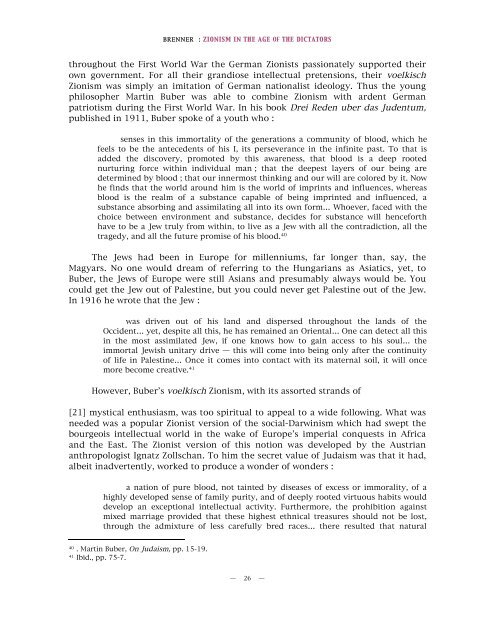You also want an ePaper? Increase the reach of your titles
YUMPU automatically turns print PDFs into web optimized ePapers that Google loves.
BRENNER : <strong>ZIONISM</strong> <strong>IN</strong> <strong>THE</strong> <strong>AGE</strong> <strong>OF</strong> <strong>THE</strong> <strong>DICTATORS</strong><br />
throughout the First World War the German Zionists passionately supported their<br />
own government. For all their grandiose intellectual pretensions, their voelkisch<br />
Zionism was simply an imitation of German nationalist ideology. Thus the young<br />
philosopher Martin Buber was able to combine Zionism with ardent German<br />
patriotism during the First World War. In his book Drei Reden uber das Judentum,<br />
published in 1911, Buber spoke of a youth who :<br />
senses in this immortality of the generations a community of blood, which he<br />
feels to be the antecedents of his I, its perseverance in the infinite past. To that is<br />
added the discovery, promoted by this awareness, that blood is a deep rooted<br />
nurturing force within individual man ; that the deepest layers of our being are<br />
determined by blood ; that our innermost thinking and our will are colored by it. Now<br />
he finds that the world around him is the world of imprints and influences, whereas<br />
blood is the realm of a substance capable of being imprinted and influenced, a<br />
substance absorbing and assimilating all into its own form… Whoever, faced with the<br />
choice between environment and substance, decides for substance will henceforth<br />
have to be a Jew truly from within, to live as a Jew with all the contradiction, all the<br />
tragedy, and all the future promise of his blood. 40<br />
The Jews had been in Europe for millenniums, far longer than, say, the<br />
Magyars. No one would dream of referring to the Hungarians as Asiatics, yet, to<br />
Buber, the Jews of Europe were still Asians and presumably always would be. You<br />
could get the Jew out of Palestine, but you could never get Palestine out of the Jew.<br />
In 1916 he wrote that the Jew :<br />
was driven out of his land and dispersed throughout the lands of the<br />
Occident… yet, despite all this, he has remained an Oriental… One can detect all this<br />
in the most assimilated Jew, if one knows how to gain access to his soul… the<br />
immortal Jewish unitary drive — this will come into being only after the continuity<br />
of life in Palestine… Once it comes into contact with its maternal soil, it will once<br />
more become creative. 41<br />
However, Buber’s voelkisch Zionism, with its assorted strands of<br />
[21] mystical enthusiasm, was too spiritual to appeal to a wide following. What was<br />
needed was a popular Zionist version of the social-Darwinism which had swept the<br />
bourgeois intellectual world in the wake of Europe’s imperial conquests in Africa<br />
and the East. The Zionist version of this notion was developed by the Austrian<br />
anthropologist Ignatz Zollschan. To him the secret value of Judaism was that it had,<br />
albeit inadvertently, worked to produce a wonder of wonders :<br />
a nation of pure blood, not tainted by diseases of excess or immorality, of a<br />
highly developed sense of family purity, and of deeply rooted virtuous habits would<br />
develop an exceptional intellectual activity. Furthermore, the prohibition against<br />
mixed marriage provided that these highest ethnical treasures should not be lost,<br />
through the admixture of less carefully bred races… there resulted that natural<br />
40 . Martin Buber, On Judaism, pp. 15-19.<br />
41 Ibid., pp. 75-7.<br />
— 26 —


